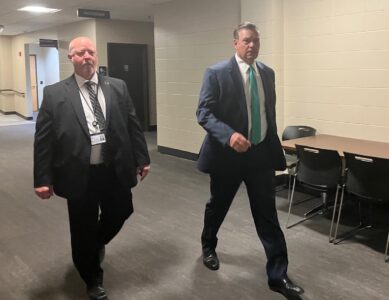Kobach’s witnesses, including ‘detransitioned’ activist, line up against ACLU’s request for SB 63 injunction

photo by: Kim Callahan/Journal-World
Kansas Attorney General Kris Kobach, right, is pictured Thursday, Nov. 20, 2025, at the Judicial and Law Enforcement Centering before entering the courtroom.
A woman who has “detransitioned” — and who regrets her transition from female to male as a young teen — told a Douglas County judge on Thursday that she supports Kansas’ law that bans gender-affirming medical interventions for minors.
“If California had a law like this when I was 13, none of this would have happened to me,” said Chloe Cole, a well-known 21-year-old activist from California who has testified before numerous state legislatures and who works for an organization called Do No Harm.
Taking puberty blockers and testosterone at age 13 and getting a double mastectomy at age 15 has left her with psychological and physical trauma, she told Douglas County Judge Carl Folsom III, who will decide in coming weeks whether to temporarily block the Kansas law known as Senate Bill 63, as requested by the ACLU on behalf of two teen plaintiffs who now must travel to other states for care.
“I will live with the consequences for the rest of my life,” Cole said in response to questions by Kansas Attorney General Kris Kobach, who was in Lawrence Thursday to ask Folsom to deny the ACLU’s request.

photo by: Phil Sears/AP File
Chloe Cole, center, is recognized by Florida Gov. Ron DeSantis during a joint session for his State of the State speech at the Capitol in Tallahassee, Fla., March 7, 2023. Cole received puberty blockers when she was 13, and underwent a double mastectomy at 15. Now she is an advocate against allowing those procedures on children.
Senate Bill 63 was passed by the Kansas Legislature earlier this year over Gov. Laura Kelly’s veto; it bans gender-affirming care such as puberty blockers, hormone therapies or surgeries for minors.
Cole listed numerous changes that she believed she was not informed about and that are not easily reversible, including pelvic and joint pain, urinary tract infections, blood in urine, widened shoulders, an Adam’s apple, an enlarged clitoris, unpredictable menstrual cycles and possible infertility.
A witness for the ACLU, Dr. Angela Turpin of the Gender Pathways clinic with Children’s Mercy Hospital, told the court that she was “heartbroken” as she listened to Cole’s testimony because it was evident to her, as an expert who has overseen many successful teen transitions, that Cole was not adequately assessed before she began her medical transition, had not possessed the maturity to make such decisions and was not properly monitored by health care providers as the medical transitioning was happening or ending.
Such a transition would not have occurred under the auspices of the Gender Pathways clinic, Turpin said, because they operate within a framework of “multilayered, careful” assessments, diagnoses, psychological evaluations, consent forms and ongoing monitoring, pursuant to the guidelines of the Endocrine Society.
Turpin, who testified Wednesday about the benefits of gender-affirming care, also questioned whether some of the long-term side effects Cole mentioned, such as blood in the urine, joint pain, unpredictable menstruation and others have any relation to the medical transition at all. She also indicated that Cole was too young at 13 to be given testosterone and wasn’t a good candidate for puberty blockers because she had already developed significant breast tissue and had had several periods.
“There was nothing left to block,” said Turpin, whose clinic does not perform surgeries or refer them out. She also noted that Cole’s decision to quit her treatments at age 16 “cold turkey” was not a good practice. Turpin said that at Gender Pathways they would monitor people who had decided to discontinue hormones to make sure they had appropriate psychological and medical support.
“People aren’t on autopilot,” she said. “We continually re-assess.”
Cole had also testified that she didn’t think of herself as trans until about age 12 when she got a phone and started connecting with other girls online who were talking about discomfort around puberty. She too started feeling like she had “the brain of a boy in the body of girl” — in her case, a well developed body that attracted unwanted attention from males.
Turpin, though, said she had never really seen a case where “social contagion” had made someone trans. She said she screens for the amount of time someone has had symptoms of gender dysphoria and that someone coming in based on peer group suggestions was “not something we see” or would treat.
When asked by Kobach about studies that have indicated that transgenderism used to be a largely male phenomenon but that now it’s mostly girls, she said, “I don’t have an answer for that.”
In addition to Cole, who has said there’s an “ideological cult around transgenderism” and that trans people are “delusional,” the state on Thursday called a handful of out-of-state witnesses who expressed disapproval of medical transitioning for minors based on a host of objections.
A retired plastic surgeon, Dr. Patrick Lappert, said that transgender surgery is simply a “cosmetic” procedure because it’s not motivated by the “loss of a function” and is “disfiguring.” On cross-examination by an ACLU attorney, he acknowledged that he has referred to transgender surgery as “evil” and as a “mutilation.” His testimony was limited, however, because the ACLU’s request for an injunction of SB 63 does not pertain to surgery.
James Cantor, a sex researcher from Canada, questioned the “science” around transitioning in minors, noting that systematic reviews of the evidence — such as those done in recent years in the United Kingdom and Scandinavia — had not been done in the United States. The European studies, in particular the Cass Review, have concluded that there’s a lack of evidence supporting many treatments, including puberty blockers. In response to that review, Britain has limited gender transition interventions, including puberty blockers, except for limited research purposes.
Cantor called the Cass Review “strong and reliable,” but said he has “no horse in any of these races.”
Dr. Daniel Weiss, an endocrinologist from Utah, said there too many long-term unknowns regarding minors taking opposite-sex hormones and puberty blockers, and he said such prescriptions “medicalize a person for life.” The idea that puberty blockers simply “pause” puberty, which could then be restarted without effects, was not credible to him. He also cited increased cancer risks from opposite-sex hormones, something Turpin had disputed.
“I don’t use the term ‘gender-affirming care,'” he said, “because I don’t think it’s care. I think it’s harm.”
On cross-examination by the ACLU, Weiss said that he is also opposed to simple social transitioning that doesn’t involve any medical intervention at all. The ACLU attempted to show that his opinions were informed by a traditional view of gender roles and sexuality, noting that he elsewhere had said that having same-sex parents is “more likely to be associated with significant pathology.”
The state’s final witness, Farr Curlin, a medical ethicist from Duke University, testified that medical interventions in minors were “ethically problematic” because they “aim to suppress healthy features of a child’s body” and because minors are not capable of informed consent regarding possible implications decades hence. Curlin criticized the “consumer model of medicine,” which he said elevates “wants” over medical necessity.
On cross-examination, he admitted that his Christian views informed his professional opinions to an extent and acknowledged that he has also labeled contraception and IVF as “ethically problematic” because they are not “for the healing purpose of medicine.”
Attorneys for the ACLU questioned the qualifications of the state’s witnesses, indicating that none of them had ever worked with minors who have gender dysphoria.
In closing arguments, Harper Seldin for the ACLU, told Judge Folsom that SB 63 is against the Kansas Constitution, which he said explicitly protects “natural rights,” such as parental rights to make medical decisions. He argued that SB 63 was impermissibly aimed at transgender people solely for a discriminatory purpose and that its enforcement by the state would irreparably harm the plaintiffs.
Kobach countered that the law did not discriminate against anyone based on sex or gender — it applies to everyone — and that the state had an important interest in protecting children from the risks associated with gender-affirming medical interventions. He argued that the Kansas Constitution is “co-extensive” with the U.S. Constitution and does not confer an additional right, such as the right of a parent to obtain whatever medical procedure they want for a child.
He said that the plaintiffs were not likely to ultimately succeed on the merits of their case — a required finding for a temporary injunction — because a recently decided U.S. Supreme Court case “controlled” now. That case is United States v. Skrmetti, which held that a Tennessee law banning puberty blockers and hormone therapy for minors did not violate the 14th Amendment’s Equal Protection Clause.
Folsom asked the parties to submit written findings of facts and conclusions of law by Dec. 19, and he will render a decision sometime after that.






